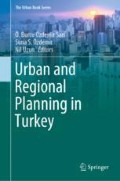Abstract
Urban and regional planning , as an institution, differs significantly from country to country depending on the legal and institutional contexts of each state. The significance of urban and regional planning increased in Turkey in 1923 following the foundation of the Republic. Economic policies executed by the government have always had an effect on urbanisation in Turkey. In fact, different economic policies and models applied since 1923 defined the different periods of urbanisation in the country. These periods also define the changes in urban and regional planning. There are basically four different models of economic development applied starting from 1923. A centralised, state-dominated model was the first one, and it was implemented until the 1950s. Liberalisation, the second model, was adopted in the 1950s. Mechanisation in agriculture set off rural-to-urban migration , and the rate of urbanisation increased very rapidly. This period lasted until the 1980s when Turkey’s economy underwent radical changes with the introduction of the privatisation model within the context of globalisation. The fourth period, starting after the general elections of 2002, can be considered a continuation of the third one. Economic and political changes in this period have had substantial implications for cities.
Access this chapter
Tax calculation will be finalised at checkout
Purchases are for personal use only
Notes
- 1.
In 2011, the name of the Ministry changed to Ministry of Environment and Urbanization.
- 2.
These offices are abolished in the 1980s.
- 3.
The detailed explanation about different plan types and institutions involved is given in Chap. 2.
References
Balaban O (2013) Neoliberal yeniden yapılanmanın Türkiye kentleşmesine bir diğer armağanı: Kentsel dönüşümde güncelin gerisinde kalmak (Another legacy of the neoliberal restructuring to Turkish urbanization: Lagging behind the contemporary urban transformation). In: Çavdar A, Tan P (eds) Istanbul: Müstesna şehrin istisna hali. Sel, Istanbul, pp 51–80
Baş Y (2003) Designing urban space with the tools of the development legislation. Dissertation Middle East Technical University
Boratav K (1999) Açık ekonomi koşullarında yeniden inşa: 1923–1929 (Reconstruction under open economy conditions: 1923–1929). In: Baydar O (ed) 75 yılda çarklardan chiplere. Tarih Vakfı, Istanbul p, pp 23–32
Boratav K (2014) Türkiye iktisat tarihi 1908–2009 (History of Turkish economy 1908-2009). İmge Kitabevi, Ankara
Eraydın A (1999) Sanayi’nin Anadolu’ya yaygınlaşması ve son dönemde gelişen yeni sanayi odakları (The spread of the industry to Anatolia and the recent development of new industrial districts). In: Baydar O (ed) 75 yılda çarklardan chiplere. Tarih Vakfı, Istanbul p, pp 257–277
Kepenek Y (1999) Türkiye’nin 1980 sonrası sanayileşme süreci (Industrial development of Turkey after 1980). In: Baydar O (ed) 75 yılda çarklardan chiplere. Tarih Vakfı, Istanbul p, pp 229–240
Keskinok HÇ (2010) Urban planning experience of Turkey in the 1930s. METU J Fac Archit 27(2):173–188
Öniş Z (1997) The political economy of Islamic resurgence in Turkey: the rise of the Welfare Party in perspective. Third World Q 18(4):743–766
Öniş Z (2012) The triumph of conservative globalism: the political economy of the AKP era. Turkish Stud 13(2):135–152
Şengül HT (2009) Kentsel çelişki ve siyaset: Kapitalist kentleşme süreçlerinin eleştirisi (Urban conflict and politics: criticism of capitalist urbanisation processes). İmge Kitabevi, Ankara
Tekeli İ (1998) Türkiye’de Cumhuriyet döneminde kentsel gelişme ve kent planlaması (Urban development and urban planning in the Republican era of Turkey). In: Sey Y (ed) 75 yılda değişen kent ve mimarlık. Istanbul, Tarih Vakfı, pp 1–24
Türel A (1998) Kent ve ulaşım (City and transportation). In: Sey Y (ed) 75 yılda değişen kent ve mimarlık. Tarih Vakfı, Istanbul, pp 155–171
TURKSTAT (2003) 2000 Census of population: social and economic characteristics of population. TURKSTAT Ankara
TURKSTAT (2008) News Bulletin, No 9, 21.01.2008, www.tuik.gov.tr. Accessed Jan 2009
Türkün A (2011) Urban regeneration and hegemonic power relationships. Int Plann Stud 16(1):61–72
Uzun CN (2001) Gentrification in Istanbul. KNAG, Utrecht
Author information
Authors and Affiliations
Corresponding author
Editor information
Editors and Affiliations
Rights and permissions
Copyright information
© 2019 Springer Nature Switzerland AG
About this chapter
Cite this chapter
Uzun, N., Özdemir Sarı, Ö.B., Özdemir, S.S. (2019). Urbanisation and Urban Planning in Turkey. In: Özdemir Sarı, Ö., Özdemir, S., Uzun, N. (eds) Urban and Regional Planning in Turkey. The Urban Book Series. Springer, Cham. https://doi.org/10.1007/978-3-030-05773-2_1
Download citation
DOI: https://doi.org/10.1007/978-3-030-05773-2_1
Published:
Publisher Name: Springer, Cham
Print ISBN: 978-3-030-05772-5
Online ISBN: 978-3-030-05773-2
eBook Packages: Earth and Environmental ScienceEarth and Environmental Science (R0)

